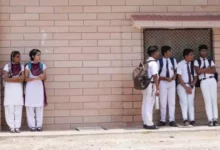VC Pandit claims that JNU has a problem with “freeloaders,” citing overstaying students and undocumented visitors
Jawaharlal Nehru University (JNU) Vice Chancellor Santishree Dhulipudi Pandit says the university is tightening its nets against “freeloaders,” which include both overstaying students and undocumented visitors.

In an interview with PTI editors at the agency’s headquarters, Pandit said that she has given the hostel management explicit orders not to let any student remain in a hostel for more than five years.
When asked about claims that JNU has allowed freeloaders to remain on campus at the expense of taxpayer money, Pandit said, “You are 100% correct—we have a problem with freeloaders.” The 61-year-old, who graduated from the institution herself, said that while the problem existed even when she was a student, it has since become worse.
“There were a lot of students that remained over while I was there, but they weren’t extremely common. JNU also produces some illusions. Some students want everything to be free or heavily subsidized. Although the Lok Sabha cafeteria is more expensive than the JNU canteen, she pointed out that professors were stricter back then.
“I was informed by the professor overseeing my study that I would be dismissed after four and a half years if I didn’t finish it. I was certain that he wouldn’t sign my fellowship renewal. This has, in my opinion, evolved throughout time. According to Pandit, the number of extensions has increased because certain teachers have allowed them.
Pandit obtained her master’s degree from Presidency College in Chennai and then went on to do her MPhil and PhD at JNU from 1985 to 1990.
“There are other individuals on campus who are uninvited visitors; they do not even attend JNU but yet come and remain. They are either getting ready for other tests or for the UPSC. For them, the most affordable location to stay is JNU. Where in southwest Delhi can one get such lodging with greenery spanning 2,000 acres, along with such affordable cuisine and dhabas?” she enquired.
Pandit said, “Now we are trying to bring this down to a large extent,” regarding the measures her government is doing to address the problem. Even though it is exceedingly difficult for us to enter the rooms, we nonetheless follow the procedures. We also make an effort to appeal to the kids’ common sense by asking them to at least let us know if they are bringing a visitor. Additionally, we have strengthened hostel management, prohibiting any student from staying longer than five years. We are now requiring ID cards. We advise students to always carry their ID cards and to show them upon request. Since some pupils don’t appreciate these outsiders, we are also urging the students to report,” she said.
A list of unpaid mess bills of more than Rs 2.79 crore from dormitory residents was released by JNU in 2019, sparking outrage from a variety of sources. At the time, the students’ union described the action as an effort to intimidate students.
When the institution raised fees in 2019, there were also significant protests.
After the 2016 sedition incident around “anti-national” chants shouted at the university, which resulted in the detention of the then-president of the students’ union, Kanhaiya Kumar, along with others, the accusations of “freeloaders” on campus were also made.
Subsequently, a number of internet petitions were launched to discontinue using public funds to support JNU.
The students’ union, which has been accusing university administrators of turning the campus into a “jail,” has resisted the administration’s efforts to impose mandatory ID checks and CCTVs on campus.






